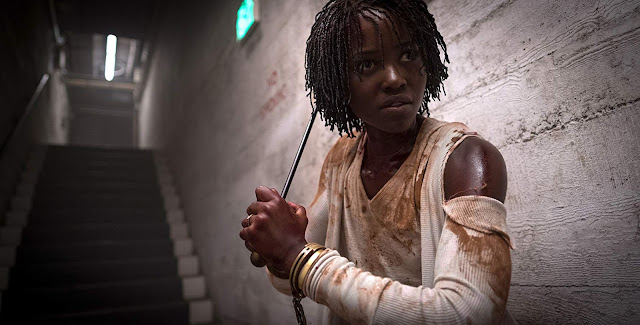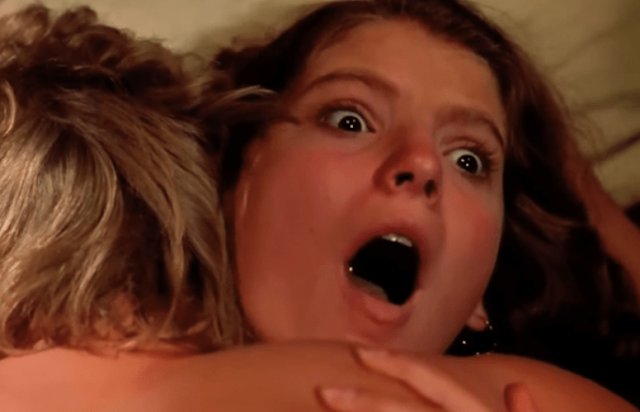The meaning(s) of Jordan Peele's Us
Us is a movie brimming, perhaps overstuffed, with ideas. It's also highly ambiguous. What is the meaning behind the Tethered?
We certainly have plenty of theories. Check out our best guesses below.
Warning: There are some pretty hefty spoilers below. Read on at your peril!
1) The enemy within
The movie's fantastic ending really hammers home the idea that the thing we really ought to be afraid of is ourselves.
During Adelaide and Red's final confrontation, Red reminds her that the Tethered are only humans, with skin and teeth. Cue the big reveal: Adelaide was Tethered all along, and the psychotic Red was the cute little girl we saw lost at the fairground in the film's prologue.
Peele has admitted that the movie's message is something along these lines. “We are our own worst enemy," he told The Guardian, "not just as individuals but more importantly as a group, as a family, as a society, as a country, as a world."
Following this reading to its logical conclusion: is Us an ode to self-destruction in a similar way to 2018's fantastic sci-fi horror Annihilation? Is Peele saying we all have a darker shadow self that's primitive, squawking and ready to wreak havoc?
2) "We're Americans."
Perhaps the key moment in Us is when the Wilsons ask their doppelgangers to identify themselves, only for Red to chillingly respond: "We're Americans." Does Us share Get Out's incisive political sting?
After all, Peele doesn't just envisage shadow selves, but a shadow subterranean society that mirrors the world above like a dark underbelly.
Red's opening monologue describes the Tethered's life of hardship, in stark contrast to the middle class world of yatchs and holiday cottages we see at the start of the film.
At the movie's conclusion, we see the affluent holidaygoers enjoying the funfair on the Santa Cruz Boulevard mirrored lifelessly and joylessly below. Implicit in the surface dwellers fun is the Tethered's suffering.
Note how easy it is to slip into the underclass. As a child, one minute Adelaide was enjoying a birthday treat at the funfair. The next she was facing a life underground.
3) The green eyed monster
Most of the comedy at the start of the film comes from Gabe's hopeless jealousy of his wealthy (but pretty horrible) friends the Tylers.
They've got a bigger boat. A fancy house. More outwardly successful children.
Yet the arrival of the Tethered brings with it a more sinister look at envy. Red would have memories of the surface world, yet most of her life has been spent underground with dinners of raw rabbit.
Ultimately the Tethered seem to get no satisfaction from taking their originals' places above ground. Red's envy of Adelaide eventually leads to her death.
The meaning of Jeremiah 11:11? It's a passage on God's anger at the Jews for worshipping false idols, and the dreadful wrath they'll face as punishment. It's easy to associate this with American materialism.
And is it a coincidence that Abraham, Gabe's doppelganger, is butchered by his own yatch?
4) Sinister experiments
Get Out has a strong flavour of B movie sci fi, and Us continues in a similar vein.
We eventually learn that the Tethered are a government experiment gone wrong, an attempt to control the people above by cloning them. But the scientists realised that the clones didn't have souls, and could only mirror the actions of their originals above.
A throwaway line from Zora about the government controlling people's minds by putting flouride in the water could be more significant than we give it credit for.
When the Tethered's plan goes off without a hitch, we're left with the stark pointlessness of their takeover. We last see them in an eerie echo of the failed 1986 charity event Hands Across America, based on a dim memory Red has from her time on the surface.
Like the charity event, the long line of Tethered arm in arm feels like an empty gesture. They don't know what to do next. They killed without really knowing what killing meant. Once the lives and possessions of their originals were theirs for the taking, they didn't know what to do with them.
They have the power now, but it won't bring them any joy. Just like the goverment's abandoned experiment, all of the mass murder was futile.
5) Know thyself
In another key scene, the Wilsons watch the Thethered's takeover on the news and realise that most people aren't aware that the Tethered are doppelgangers at all.
On a symbolic level, people are struggling to recognise the scissors-weilding maniacs as themselves.
Critics have often talked about the concept of a "Jungian shadow self" in relation to Us. Jung believed that we are unable to acknowledge our darker unconscious selves. Instead we externalise it and project it onto other people.
In this sense, the Tethered are literal externalisations of our primal shadow selves, with their animal-like noises and primeval instinct to kill.
One of the reasons the Wilsons survive is because they recognise the Tethered as crucially linked to themselves. They know to stay on the move because the Tethered "think like us".
Adelaide knows that to save her family, she has to return to the scene of her original trauma in the hall of mirrors. Only by accepting the darkness within herself (notice how Adelaide grunts like a Tethered when she kills Red) can she find some resolution.
Fill your Twitter feed with witty horror banter. Follow us:Follow @GoreConnoisseur









Comments
Post a Comment